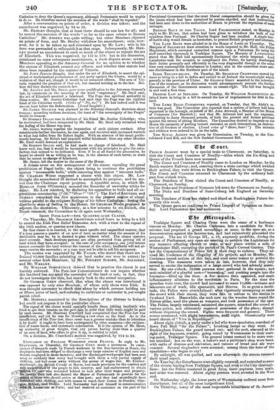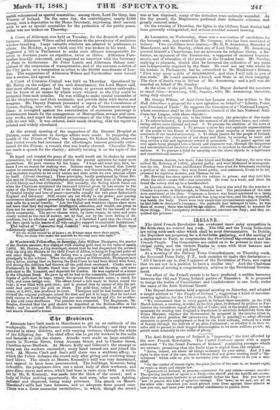lEkt iiitttropotis.
Trafalgar Square and Charing Cross were the scene of a burlesque &mute on' Monday. Mr. Charles Cochrane, late a candidate for West- minster, had proposed a grand assemhinge at noon, in the open air, as a demonstration against the Income-tax., and had extensively placarded the proposal. The act 57 George IIL, q. 19; expressly prohibits, during the session of Parliament, any open-air meeting to petition the Legislature for any measure affecting chtirch or Step' at`any place within a mile of Westminster Hall, excepting the Parishof St. Paul's Covent Garden. This law. the Commissioners of Police felt It their du.ky to enforce. They ad- vised Mr. Cochrane of the illegality of his project; aed on Monday, Mr. Cochrane issued notices of this fact, and used some means to prevent the meeting. The measures were taken so late, however, that they only served to excite the indignation of a large crowd who had &dismay assem- bled. By one o'clock, 10000 persona were gathered in the square; and mob-mischief of a playful sort-1' boneeting," and pushing people into the fountains—filled up the time. A few tFators then appeared, and made inflammatory allusions to the revolutidu in Paris. By the time the speeches were over, the crowd had increased to some 15,000,—artisans and labourers out of work, idle spectators' and thieves. In so great a multi- tude, the Police were everohelmed: after vigorously attempting to resist the crowd with their staves, they were Mn to retreat to the station in Sc3fland Yard. Meanwhile, the mob tore up the wooden fence round the Nelson pillar, used the pieces as weapons, and took possession of the spot. The Police, largely reinforced, reentered the equine, attacked the crowd at various points, and ultimately regained poesession of the place; though without dispersing the crowd. Fights were frequent and general. These scenes continued, with alight interaission, until night. Occasionally were heard shouts of" Viva la Republique!" About eight o'clock, party under shad who wore ePaulettes, marched off down Pall Mall "for the l'alace"- breaking lamps as they went. At Buckingham Palace, the geard turned out; and the mob, alarmed at the eight of the bayonets, evaded; going round.' by Westminster to their start, ing-point, Trafalgar Square. The general intent seemed to be mere wan- ton mischief; but on the way, a baker's and a publican's shop were beset, with oaths of distress and starvation, and rations of bread and ale were exacted. Several ringleaders were arrested; among them the hero of the epaulettes—who began to mi.!
By midnight, all was quelled, and soon iftervrirds the streets resumed their usual aspect. , On Tues3ay, the disturbances were slightly renewed, and extended to some of the Streets leading from Trafalgar Square, and eveii to the City thorough- fares: but the Police mustered in great force, more captures were made, and order was restored. About eighty persons were arrested in the West end.
On Wednesday night, the lower parts of Westminster suffered most from disturbance, but all of the most insignificant kind. On Thnioe:lay, many of the most restiectsble inhibiteuts of St. James's parish 'volunteered as special constables; among them, Lord De Grey, late viceroy of Ireland. On the same day, the coalwhippers, nearly 2,000 strong, sent a deputation to the Home Secretary, expressing their earnest wish to act as special constables for the protection of the public peace. Order was not broken on Thursday.
A Court of Aldermen was held on Tuesday, for the despatch of public business. Aldermen Wilson called attention to the prevalency of malicious window-breaking. Large valuable windows are selected in preference to others.. On Monday, a pane which cost 95/. was broken in his ward. He suggested a bill in Parliament to make such offences transportable for seven or fourteen years on repetition, twice or thrice. Alderman Fare- brother heartily concurred, and suggested an interview with the Secretary of State in furtherance. Sir Peter Laurie and Alderman Sidney com- plained of the suspension of transportation, and of the extreme comfort of the City gaols, as a temptation to crime to the 30,000 mendicants-of Lon- don. The suggestions of Aldermen Wilson and Farebrother were turned into a motion, and agreed to.
A Court of Colin:UM eouncil was 'held on Thursday. Questioned by Mr. Bailey on the subject of the mob disturbances, the Lord Mayor said, that most effectual metals, had been taken to prevent serious outbreaks; but he knew of no Means by which every window in the City could be protected from mob missiles. He was willingto make special constables of all the shopkeepers and their assistants, and, provide them with staves and weapons. Mr. Deputy Peacock presented a report of the Commission of Sewers, dealing, inter (die, with the subject of the Government sanatory plans: it inveighed Against the concentration of enormous patronage in Government hands for the management of Metropolitan sewage and sana- tory wirks, and urged the decided perseverance of the City in Parliament with its own bill. It was ordered, amid much cheering, that the report be printed and widely circulated.
At the annual meeting of the supporters of the German Hospital at Dalston some allusions to foreign affairs were made. In proposing the health Of the Prince of Wales the Chairman, Sir Robert Inglis, observed that recent events had increased the affectionate interest generally enter- tained for the Prince; a remark that was loudly cheered. Chevalier Bun- sen made a speech for the charity; adroitly turning it on the topic of the day. He hoped and trusted the peace of the world would not be shaken by recent commotions, but would victoriously survive the present agitation for many more
generations. He gave reasons for his hopes. I hope and trust this, first, be- cause I see no reason for making war. Nations must have learned that liberty cannot be cemented by attacking that of others; and Governments, that policy as well asjustice requires.to let every nation and state settle its own internal affairs by itself. (Great cheering.) These principles, loudly proclaimed by Great Bri- tain and by Prussiaewill be established generally as the real fruit of the progress of civil liberty and true civilization." But:secondly, the feeling which burst out .when the Chairman mentioned the increased interest given by late events to the name Of the Prince of Wales and to the Royal Family of England—that feeling 'of blended loyalty and love of peace—pervades equally the two great fatherlands England and Germany. Still, events are not wholly in our power; and passing occurrences should appeal powerfully to the higher social classes. The social at- taek cc11 ibrs social remedy. "Let the higher and wealthier classes show more and mere tbethey 6?e,1 Superb/.ar intellignre, education, and wealth, are given to them not for mere enjoyment—not for selfish purposes, but for the bet:feat of the whole community. The poczer classes must, by these means, be more and more closely united to the rest of society, not by fear, nor by the mere feeling of de- pendence, but by affectioe and gratitude; a d therefore I said that the events of our days speak to the hearts of all who can give support to charitable institutions." 'the ballad of J9tuziette nn4 Jeinnot " was sung, andlhese lines were
ve.Ifeniently aPPlanded— '
4-All the world should be at -Reece i or, likings mast show their might, Why, let them who make the quarrels be the only men who fight"- -
. .
At WandsweitkPelice-office, nSaSurdey,,John William Thompson, the master of the Medora steamer, was charged with stealing gold-dust to the value a yearly, 7,0001 Mr. Hutton, &City Merchaet,'stated that he had despatebed the accused with his ship the Medora to the Gold Coast of Africa, to bring to England palm-oil and other freight. Arming the lading was 'a quiunity of gold-dust, consigned principally Mahe witness. When the ship arrived at Portsmouth, Thompson sent him aletter, stating that on leaving the Gold Coast he had been seized With fever, 'lima during the dehrium had thrown all the gold-dust overboard. -Clerks sent to Portsmouth by Mr. Ifutt6n found that the prisoner had left his ship, sold some gold-dust to Mr. Emanuel, and departed for London. He was captured at a house an the .01apham Roads He gave up all he had to the constable, 116 pounds avoir- -dupois of gold-dust in bags, twenty five-pound Portsmouth notes, a check for .1421, and some foreign coin. The officer found a belt made to fasten round the ,body; it was filled with gold-dust; and it seemed that by means 'of this the pri- soner had conveyed the gold on shore. The gold-dust, valued at 31 17s. pe'r 'Ounce, qr 6;400/, Was produced in court. Thompson said he had broken and de- stroyed the original yackages, mixed the dust and imit it in bags; that he had sold sixty ounces to Emanuel, receiving 60a. per ounce for one lot and 65e. for another: he also sold some denlikons. The prisoner was remanded. The Magistrate, Mr. Nadel", directed that the gold should be deposited at the Bullion-office in the Bank; and he advised Mr. Hutton to proceed to Portsmouth, obtain arm:rant, 'and searchEmanuel's house.



























 Previous page
Previous page